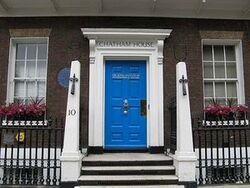Difference between revisions of "Chatham House Rule"
(Created page with "{{concept |wikipedia=https://en.wikipedia.org/wiki/Chatham_House_rule |image= |constitutes=secrecy |start=June 1927 |description=Secrecy, UK Deep state style }} The '''Ch...") |
(could need more thought - but unstub) |
||
| (3 intermediate revisions by 2 users not shown) | |||
| Line 1: | Line 1: | ||
{{concept | {{concept | ||
|wikipedia=https://en.wikipedia.org/wiki/Chatham_House_rule | |wikipedia=https://en.wikipedia.org/wiki/Chatham_House_rule | ||
| − | |image= | + | |image=Chatham house.jpg |
| + | |image_caption=The [[Royal Institute of International Affairs]] in London. | ||
|constitutes=secrecy | |constitutes=secrecy | ||
|start=June 1927 | |start=June 1927 | ||
| − | |description=Secrecy | + | |description=Secrecy [[UK Deep state]] style |
}} | }} | ||
| + | The '''Chatham House Rule''' is a system for holding debates and discussion panels on controversial issues, named after the headquarters of the UK [[Royal Institute of International Affairs]], based in Chatham House, London, where the rule originated in June [[1927]]. | ||
| − | + | At a meeting held under the Chatham House Rule, anyone who comes to the meeting is free to use information from the discussion, but is not allowed to reveal who made any comment. | |
| + | {{QB|{{t|When a meeting, or part thereof, is held under the Chatham House Rule, participants are free to use the information received, but neither the identity nor the affiliation of the speaker(s), nor that of any other participant, may be revealed.<ref>https://www.chathamhouse.org/about-us/chatham-house-rule</ref>}}}} | ||
| − | + | ==Official narrative== | |
| + | Wikipedia comments that "It is designed to increase openness of discussion". Of course this openness only applies ''internally'', as the general public is held in the dark about these discussions and what is agreed upon. | ||
| + | |||
| + | Chatham House states that the singular should be used as there is only one rule,<ref>https://www.chathamhouse.org/about/chatham-house-rule</ref> although some groups such as the [[Institute for Statecraft]] use the plural. | ||
| + | |||
| + | ==Criticism== | ||
| + | However, the Rule is used in ways that do not promote transparency. For example, it is often misinterpreted to prevent members of a meeting from conveying that the information originates from a backroom meeting, or telling the information provided at the meeting. | ||
| + | |||
| + | In addition, all too often the Rule is invoked not because the content of a meeting is particularly sensitive, but because it creates an aura of importance. It conveys the message that something important will be discussed at this meeting. However, the function of this is more in marketing a meeting rather than creating a safe setting for revealing secret, confidential, or new information. | ||
| − | |||
| − | |||
{{SMWDocs}} | {{SMWDocs}} | ||
==References== | ==References== | ||
{{reflist}} | {{reflist}} | ||
| − | |||
Latest revision as of 06:21, 25 June 2022
(secrecy) | |
|---|---|
 The Royal Institute of International Affairs in London. | |
| Start | June 1927 |
| Secrecy UK Deep state style | |
The Chatham House Rule is a system for holding debates and discussion panels on controversial issues, named after the headquarters of the UK Royal Institute of International Affairs, based in Chatham House, London, where the rule originated in June 1927.
At a meeting held under the Chatham House Rule, anyone who comes to the meeting is free to use information from the discussion, but is not allowed to reveal who made any comment.
When a meeting, or part thereof, is held under the Chatham House Rule, participants are free to use the information received, but neither the identity nor the affiliation of the speaker(s), nor that of any other participant, may be revealed.[1]
Official narrative
Wikipedia comments that "It is designed to increase openness of discussion". Of course this openness only applies internally, as the general public is held in the dark about these discussions and what is agreed upon.
Chatham House states that the singular should be used as there is only one rule,[2] although some groups such as the Institute for Statecraft use the plural.
Criticism
However, the Rule is used in ways that do not promote transparency. For example, it is often misinterpreted to prevent members of a meeting from conveying that the information originates from a backroom meeting, or telling the information provided at the meeting.
In addition, all too often the Rule is invoked not because the content of a meeting is particularly sensitive, but because it creates an aura of importance. It conveys the message that something important will be discussed at this meeting. However, the function of this is more in marketing a meeting rather than creating a safe setting for revealing secret, confidential, or new information.
Related Quotation
| Page | Quote | Date |
|---|---|---|
| Institute for Statecraft/Secrecy | “No contact names should be mentioned (Chatham House rules) reference conversations and spoken word. Contact the report holders for more detailed information on individuals and encounters.” | 30 May 2018 |